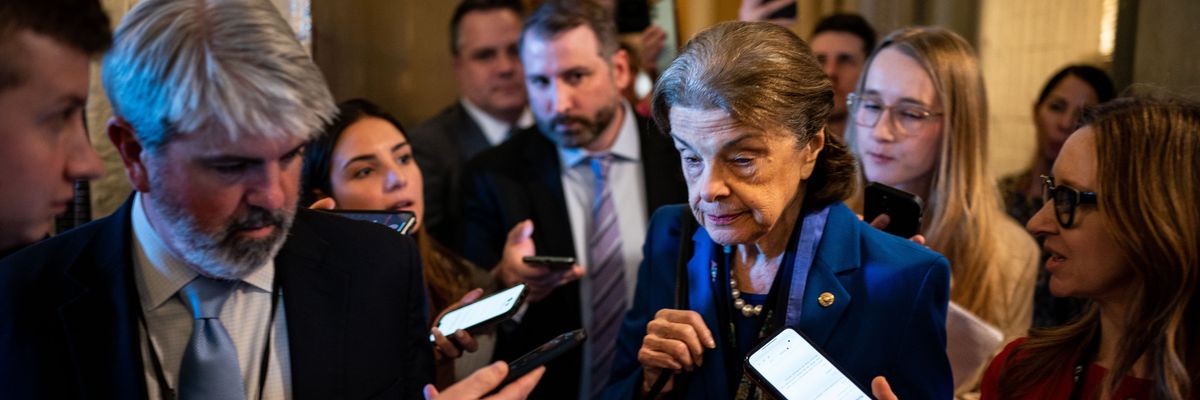Democratic Sen. Dianne Feinstein is facing fresh calls to resign in the wake of news reports detailing how her extended absence from the Senate since being diagnosed with shingles earlier this year is impacting her party's ability to confirm President Joe Biden's judicial nominees.
With Feinstein out, the Senate Judiciary Committee is deadlocked at 10-10, leaving the panel unable to advance judges that don't garner support from Republican senators.
Sen. Dick Durbin (D-Ill.), the chair of the Senate Judiciary Committee, has come under fire in recent days for letting Republicans obstruct the nomination process via the informal "blue slip" process, which effectively gives senators veto power over appointments to court seats in their home states.
But Feinstein's absence from the judiciary committee has also contributed to a marked slowdown in confirmations to open federal court positions, which Republicans rushed to fill when they controlled the Senate under former President Donald Trump.
The Senate confirmed Biden picks at a rapid clip during his first two years in office despite narrow margins in the chamber, but the pace has basically ground to a halt in recent months.
"Only two candidates for lifetime positions as judges appeared before the panel for its first judicial nominations hearing in five weeks [late last month], even though two of President Joe Biden's other nominees were pending long enough to appear before it too," Reuters reported.
Durbin himself has pointed to Feinstein's absence as a primary reason for the log-jam, noting that a "tie vote is a losing vote on the committee" under current rules.
According to The American Constitution Society, a dozen of Biden's judicial nominees are waiting for a Senate Judiciary Committee vote and six have yet to receive hearings before the committee.
"This is unacceptable," The New Republic's Alex Shephard wrote Tuesday. "It is also, like Durbin's continued inexplicable deference to blue slips, easily resolvable. It is time for Feinstein to resign her seat."
"In fact, it's long past time for her to bring her career to a close," Shephard argued. "For the past several years, there have been escalating concerns that she is no longer up to the task of serving as a U.S. senator. In December 2020, Politicoreported that there was 'widespread' fear among Democrats that Feinstein was starting to slip—which is understandable, given her age. (Feinstein, who has served in the Senate since 1992, is the oldest sitting senator.) Aides and other senate staffers told Politico that the then-87-year-old frequently 'gets confused by reporters' questions, or will offer different answers to the same question depending on where or when she's asked,' and appears 'frail.'"
In February, shortly after her office put out a statement announcing she would not run for reelection in 2024, Feinstein told reporters that she had not decided whether to retire, prompting a staffer to tell her the statement was already released.
The California senator is set to leave office in January 2025, and several prominent Democrats—including Reps. Barbara Lee, Katie Porter, and Adam Schiff—are vying for her seat.
"Her absence is keeping Democrats from getting things done. While she may return, the angst over her declining health will remain; it is not unreasonable to expect she will miss time in the future."
The Senate is currently on recess until April 17, and it's not clear whether Feinstein will be back in the chamber by then.
Shephard noted that with Feinstein's "seniority entitling her to seats on both the Judiciary and Appropriations committees, she has an outsize importance within the party, as well as, unintentionally, the Senate itself: Her absence is keeping Democrats from getting things done. While she may return, the angst over her declining health will remain; it is not unreasonable to expect she will miss time in the future."
"If Feinstein were to resign right this very moment," Shephard wrote, "California Governor Gavin Newsom could appoint her replacement, just as he did when he made Alex Padilla the state's junior senator in 2020 after Kamala Harris became vice president."
Jezebel's Kylie Cheung also argued Tuesday that Feinstein "needs to resign right now."
"Feinstein represents 40 million Americans and serves on four Senate committees," Cheung stressed. "It seems we can both thank her for her service and decades of blazing a path for women in politics and recognize that her remaining in the Senate past her ability to do her job isn't exactly a feminist victory—not when women and pregnant people stand to be harmed the most by the stalled confirmation of liberal judges."
Some commentators associated with the Democratic establishment have joined the chorus imploring Feinstein to step down.
"Dianne Feinstein, who should not be in the Senate, is now preventing us from being able to confirm judges," said Jon Lovett, who worked as a speechwriter for former President Barack Obama. "She should resign, and more people should be calling on her to resign."
The latest calls for Feinstein's resignation came days after a Trump-appointed federal judge in Texas ruled that the Food and Drug Administration's decades-old approval of mifepristone should be invalidated, a decision that further highlighted the consequences of a judicial system packed with right-wing extremists.
The Biden Justice Department is appealing the order.
If Feinstein does not resign, it's unclear whether Democrats would be able to restructure the judiciary committee to remove her from the mix and ensure a solid majority.
"That would require a resolution to pass the Senate," The American Prospect's David Dayen observed. "Normally such a resolution passes with unanimous consent, but Republicans are unlikely to help Dems pass a bunch of judges."
